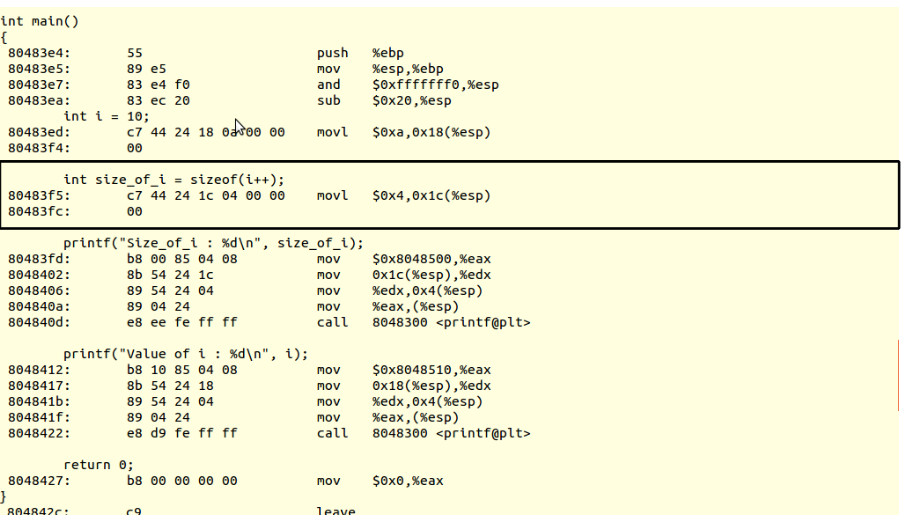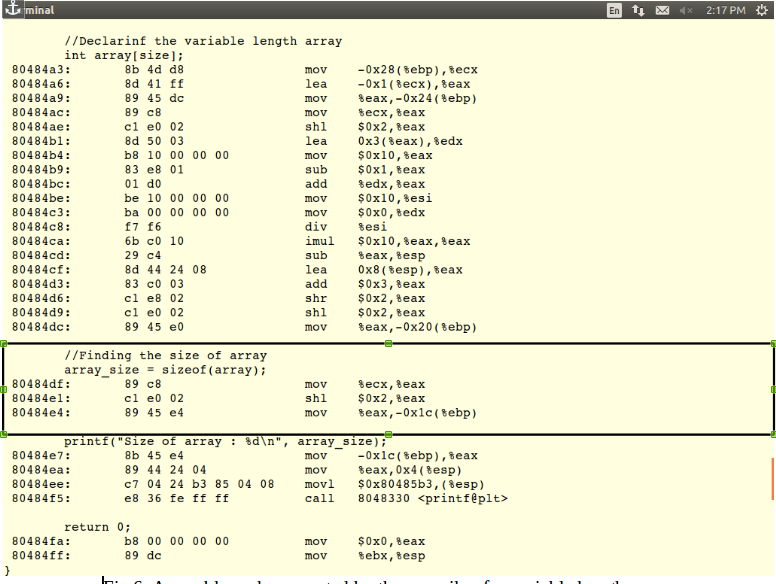sizeof : Brief
The unary operator
sizeof
is used to
calculate the size of any datatype, measured in the number of bytes
required to represent the type. The result of sizeof
is the size of the
type of the expression or parenthesized type-specifier that it
precedes, and has an unsigned integral type which is usually denoted
by size_t
( From Wiki ).
The sizeof() operator behaves
differently in comparison with other operators. In this blog let us
call out some of the uniqueness of this operator by taking two real
time programming examples. The first one is about compile time behavior and second one is during run time behavior.
Case 1: Compile time behavior
To start with, let
us consider the simple code (Fig 1 below):
Fig 1: Sample
program to demonstrate the sizeof() operator
Can you guess what would be the
output of the above mentioned program? By first look anybody would
say it as 4 (Assuming the sizeof(int) is 4 bytes) & 11. But, when
I run the program in my system, it is showing 4 & 10 (ref: Fig 2
below)
Fig
2: Output
Why are we getting the value of
variable ‘i’ as 10 instead of 11? Here is the reason:
- Sizeof operator is the only operator in C, which is evaluated at the compile time. Where sizeof(i++) is replaced the value 4.
- One can observe this, shown in the figure given below(inside the box), which contains the assembly code equivalent to the statement in C.
Fig
3: Assembly code generated by the compiler.
Note:
To obtain
the assembly code as shown in Fig 3, follow the below given steps.
+ gcc -g
filename.c ( In our case sizeof_run.c)
+ objdump
-S output_file ( In our case a.out)
From the above figure, one can
see that the sizeof() is completely evaluated at the compile time.
And the whole sizeof(i++) is replaced by the constant value 4. so,
there is no assembly code for i++ at all, which is to be evaluated
at the run-time.
Case 2: Run- time behavior
As, I told before Sizeof()
operator is the only operator in C, which is evaluated at the compile
time.But, there is an exception for
this in C99 standards, for variable length arrays.
To start with, Let us consider
an code snippet shown below,
Fig
4: Code containing variable length array
Let us see the output, when the
above code is compiled & run ( shown in fig 5 below)
Fig 5: Output of the
sizeof_run.c
From the above output it is very
clear that sizeof() operator is evaluated at the run-time, One can
observe the equivalent assembly code generated by the compiler as
shown in the Fig 6 given below.
Also, see the difference between
the assembly code in the Fig 3 & Fig 6.
Fig 6: Assembly code generated
by the compiler, for variable length array.
According
to the C99 standards, the sizeof()
operator yields the size (in integer
bytes)
of its operand, which may be an expression or the parenthesized name
of a type. If the type of the operand is a variable length array
type, the operand is evaluated at
run time;
otherwise, the operand is not evaluated and the result is an integer
constant, during
the compile time itself.
In the next blog we will see,
1. Need of sizeof().
2. Cases where sizeof() will not
work.
3. How sizeof() is different
from function call.






Good introduction to sizeof's compile and run time behavior. Thanks satya.
ReplyDeleteThanks Mubeen, for giving energy booster.
DeleteNice to see your comment Mubeen. Keep reading them offline and share your valuable comments as we publish more.
ReplyDelete